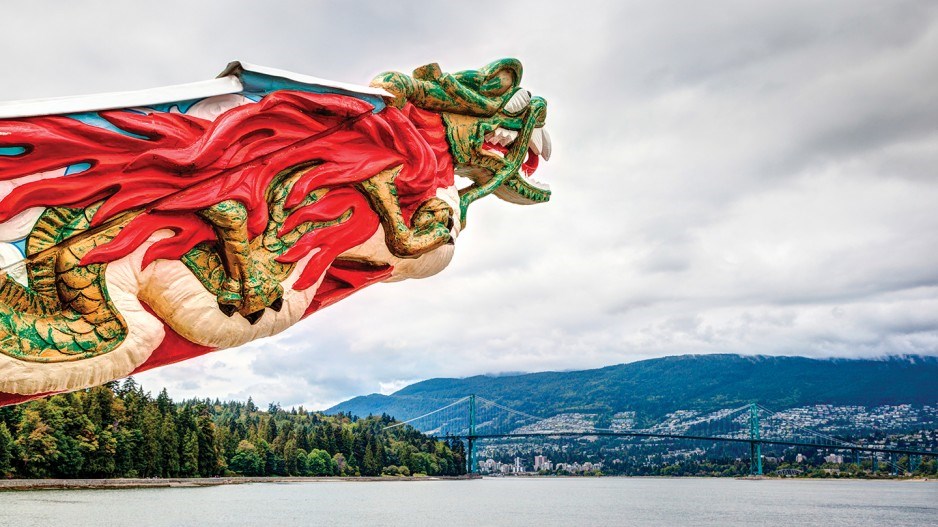With the B.C. provincial election leaving more questions than answers on which party (or parties) will hold sway over the legislature, the same uncertainty now also hangs over the future of the province’s Asia-Pacific trade plans under the new government.
That uncertainty, however, does not stem completely from the vote – which, not taking into account the absentee ballots, put the BC Liberals (43 seats) short of a majority government and leaving a possibility for the BC NDP (41) and the BC Green Party (3) to rule by coalition.
The cause lies more in the campaign’s lack of attention to the issue. None of the major parties spoke with any detail about plans for trading with Asia – a curious phenomenon, observers say, given that the Pacific Rim accounted for 35% of B.C.’s exports last year.
“In a few years, more than half of B.C. exports will go to Asia,” said Yves Tiberghien, director of the Institute of Asian Research at the University of British Columbia. “So it’s interesting to have an election where people are talking about economic growth, but there’s not much discussion on where the growth will come from.”
Three Asian countries – China, Japan and South Korea – rank among B.C.’s top four export destinations. They accounted for $5.9 billion, $3.7 billion and $2.2 billion, respectively, in 2016 exports. No other market besides the United States ($21.2 billion) surpassed the $1 billion mark.
Yet, Tiberghien noted, there was only a single reference to Asian trade in the parties’ platforms combined: a Liberal photo of Premier Christy Clark with a senior South Korean official. The NDP and the Green platforms skipped the subject completely.
“Yes, it’s a sensitive topic,” Tiberghien said, adding that Asian trade was also seldom mentioned in the 2015 federal campaign. “But you can’t run away from B.C.’s reality – and Asia is part of that reality. There needs to be more thinking through on how that relationship can really be leveraged to gain advantages for B.C. … It’s disappointing that it’s absent, and it should be part of a democratic debate [in this campaign].”
Iain Black, president and CEO of the Greater Vancouver Board of Trade, said it’s also worth noting that having an election with no clear winner doesn’t provide much incentive for other countries to expand trading relationships with B.C. But Black also cautioned against overreacting.
“Everybody needs to take a nice, deep breath,” Black said, noting that B.C.’s business leaders will keep an eye on the new government’s actions on “trade-enabling infrastructure” such as the George Massey Tunnel replacement as barometers.
“The fact that we do not have certainty yet in this election does not change the fact we have one of the most robust economies in the country, and that will still be the case in the next three weeks while we try to determine who is going to govern.”
And with the Trump administration slapping a 20% tariff on Canadian lumber in April and considering changes to the North American Free Trade Agreement, the time is crucial for B.C. to have a discussion on Asian trade as an alternative, said Zhang Jiawei, fellow and researcher at the Jack Austin Centre for Asia Pacific Business Studies at Simon Fraser University.
“With protectionism taking hold in current American trade policy, as well as EU’s existence as a single market facing more and more questions, B.C.’s economic well-being cannot be maintained without the Pacific Rim,” Zhang said. “Yes, the NDP and the Greens oppose the Kinder Morgan pipeline, which may affect the energy trade with Asia, but I think that decision ultimately rests in Ottawa. … For B.C., no matter which party ends up in power, growing trade with Asian countries is a must.”
Most observers agree that, given the Liberals’ emphasis on Asia-Pacific trade since Clark’s first mandate started in 2011, B.C.’s Asia strategy would be more predictable under a Liberal majority.
“[The Liberals] have put a lot of effort on developing trade with China, Japan, South Korea, India and Southeast Asia,” Zhang said. “I think that the Liberals, if put back in power, would retain that focus.”
If the NDP were to form the B.C. government, however, that answer becomes much more nebulous, Tiberghien said, adding that the Greens will have “unprecedented sway” in almost any scenario.
“We don’t know what the NDP will do. There has been nothing that’s being said. … They do have people that could be instrumental in building networks, but so much would depend on who is appointed to cabinet.”




